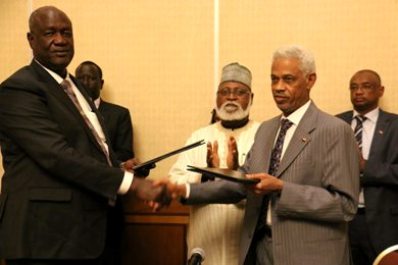Sudan and S. Sudan agree to activate the buffer zone
June 6, 2016 (KHARTOUM) – Sudan and South Sudan Sunday signed a series of security agreements, including immediate re-deployment of joint military forces along the Safe Demilitarized Border Zone (SDBZ), and approved a plan to stop supporting and harbouring rebels as well as open the crossings points.

On 14 October 2015, South Sudan’s defence minister Kuol Manyang Juuk and his Sudanese counterpart Mohamed Ahmed Ibn Ouf signed an agreement to operationalize the buffer zone between the two countries.
But the JPSC meetings to decide the effective activation were adjourned several times due to the security situation in South Sudan.
In press statements after the meeting, Sudan’s Foreign Minister Ibrahim Ghandour told reporters that the JPSC agreed to enforce all the concluded agreements on the buffer zone, flexible border and to stop supporting rebel groups.
“With regard to the support of rebel groups, specifics will be enforced by the concerned security services of both countries”.
After the signing of the Cooperation Agreement, the two countries had already deployed the Joint Border Verification and Monitoring Mission (JBVMM). But on 22 November 2013, Juba stopped the operation, fearing that delimitation of the centreline, which passes through contested areas, may be seen as final location of the boundary.
Juuk, who led the South Sudanese delegation, said the meeting ended by agreeing to implement the joint cooperation agreements signed since 27 September 2012.
The two governments, he added, will immediately start enforcing the agreed decisions.
He further stressed the need to reach negotiated solutions to end tensions on the border areas.
“The rebel movements are a reality and their problem must be solved so that peace will prevail between the two countries,” said Juuk adding “This problem will be resolved soon.”.
South Sudanese officials, on several occasions, proposed to mediate the conflict with their former comrades of the SPLM-North in the Blue Nile and South Kordofan, but Khartoum rejected this proposition saying they are party and cannot be a mediator.
Among the signed documents, the parties agreed to send separate reports to the United Nations Interim Security Force for Abyei (UNISFA) which will participate in the JBVMM and the African Union High-Level Implementation Panel (AUHIP) which brokered the deal.
They also agreed that the border crossing point committee will meet in Juba within the next two week to determine the dates and procedures for the opening of the 10 points. They will also demand the African Union to send the needed technical teams to implement the deal.
They also agreed to establish three consulates on the demilitarised border areas.
The meeting also agreed to task a joint committee headed by the directors of intelligence services with the file of the disputed areas. In addition, with regard to the committee of disputed 14 Mile, it was decided to task the chiefs of general staffs in the two countries with its chairmanship.
It goes without saying that this measure aims to the Dinka Malual and the South Sudanese People Liberation Army (SPLA) Chief of General Staff, Paul Malong Awan who convinced President Salva Kiir in November 2013 to stop the operation on the ground that it would enable Sudan to pretend in the future to the ownership of the disputed areas.
(ST)
